Solid perfumes do not contain alcohol and they are healthier than regular perfumes. Creating a solid perfume doesn’t have to be difficult. With just a few simple and natural ingredients you can make your own solid perfume with essential oils.
Natural Perfume Basics
There are three ways to make a natural perfume.
- Spray Perfume: The first option is to make a perfume by diluting an essential oil (or oils) in distilled water and alcohol. Spray the perfume on your neck and wrists. Learn how to make this perfume.
- Roll-On Perfume: Another option is to use a roller bottle and dilute an essential oil (or oils) in a carrier oil. Roll the perfume on your wrists and neck. Learn how to make this perfume. This is an alcohol-free way to make homemade perfume.
- Solid Perfume: The third option is to use a carrier oil, beeswax, and essential oil (or oils) to make a solid perfume. This is also an alcohol-free way to make homemade perfume. This article is all about how to make solid perfume.
Carrying a liquid oil in your purse can be quite messy, so a solid perfume is the way to go. Before I share my solid perfume recipe, let’s talk about each of the essential ingredients needed.
How to Make Solid Perfume with Essential Oils
Main Ingredient: Carrier Oil
Oil is the main ingredient used to make solid perfume. The oils used in do-it-yourself skincare recipes are typically referred to as carrier oils, although I usually call them nourishing carrier oils. Carrier oils dilute and “carry” essential oils safely on the skin. Essential oils should not be used directly on the skin without dilution. This is why you need a carrier oil.
The carrier oil used to make an essential oil perfume is completely up to you. Grapeseed oil, sweet almond oil, or jojoba oil are my top picks for making perfume. Virgin coconut oil may also be used, but it will impart a coconut scent on the final product.
Main Ingredient: Beeswax
Beeswax takes the carrier oil from a liquid to a solid state. Beeswax also acts as a barrier, which helps an essential oil perfume last a longer when it’s applied to the skin.
Main Ingredient: Essential Oil
Making your own natural perfume fragrance can be as easy or as complex as you’d like it to be. There are three ways to achieve a naturally-scented perfume with essential oils.
What essential oils are good for perfume?
Fragrance Option 1: Use a Single Essential Oil
To keep things simple, a single essential oil (like lavender essential oil) may be used to create a “one-and-done” perfume. This is an easy way to make a fragranced perfume at home.
Fragrance Option 2: Use Pre-Blended Essential Oils
Another simple, “one-and-done” scent option is to add a pre-made blend of essential oils to your own perfume, like: Tranquil (bergamot, patchouli, blood orange, ylang ylang, grapefruit), Love Vanilla (vanilla, ylang-ylang), Blues Buster (tangerine, geranium, grapefruit), or Spring Blossoms (neroli, sweet orange, Lime). A blend of individual essential oils, pre-mixed by the essential oil company, takes all the guess work out of creating a complex natural fragrance for perfume.
Fragrance Option 3: Blend Essential Oils to Make Your Own Scent
Individual oils may be combined to create your own perfume fragrance. To do this, you’ll need to understand the basics of blending essential oils.
How to blend essential oils for perfume…
Essential oils are divided into three main categories, based on their unique scent profile: Base Notes, Middle Notes, and Top Notes.
- Base Notes (scents are uplifting, very sharp, and slow to evaporate): cedarwood, frankincense, ginger (to Middle), jasmine (to Middle), patchouli, sandalwood, vanilla, vetiver, ylang ylang (to Middle).
- Middle Notes (scents last a couple of hours, supportive): bay, cardamom, geranium, fir balsam, geranium, ginger (to Base), helichrysum, jasmine (to Base), lavender (to Top), lemongrass, palmarosa, orange (to Top), rosemary, ylang ylang (to Base).
- Top Notes (introduce the perfume, quick to evaporate, uplifting): bergamot, clary sage (to Middle), eucalyptus, grapefruit, juniper, lemon, lime, neroli, orange (to Middle), palmarosa, peppermint, pine, tangerine, verbena.
To make your custom perfume fragrance, experiment with just a few essential oils (3-6 individual oils– preferably a good mix of Base, Middle, and Top Notes). Add two drops of a Base Note to a small amount of carrier oil, smell the oil and evaluate which Middle Note (from your oil choices) will best accompany the scent. Add two drops of the desired Middle Note, and then repeat the smell test. Finally, add a drop at a time of the desired Top Note, taking time to swirl the mixture and conduct a smell test before adding new drops. If you’d like to go back and add more of the Base Note or Middle Note, now is the time to experiment. Creating a custom scent is all about trial and error, so have fun with the process and take notes.
The essential oil (or oils) used to create your perfume will depend on your scent preferences as well as the mood you want to create. Once you know which scent you’ll be using, it’s time to make your solid perfume. Below, you’ll find my basic recipe for creating a custom perfume.
How do you make fragrance essential oil last longer?
To make a fragrance essential oil last longer, apply the perfume to areas of your skin that heat up, such as: the arm crease at the elbow, behind the ears, or your wrists. As the day goes on, your body heat will trigger the oils and you will have a longer-lasting scent. Beeswax, used to make solid perfume, also acts as a barrier and helps an essential oil perfume last a longer when it’s applied to the skin.
Keep in mind, a natural perfume, made with essential oils, will never have the staying power like those made with toxic chemicals, like phthalates. You may need to apply this perfume a couple of times a day (learn more about the toxicity of fragrance).
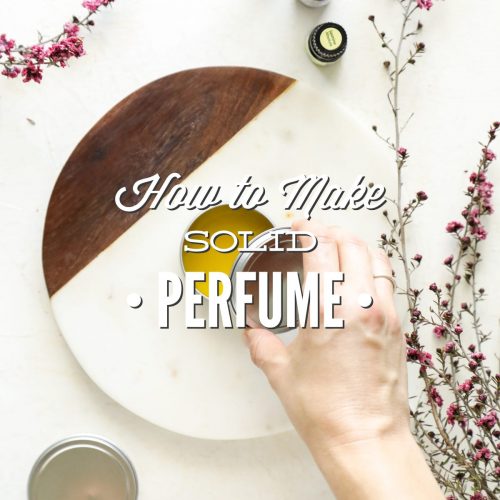
How to Make Solid Perfume with Essential Oils
Equipment
- small bowl
- medium saucepan
- small tin or you could use a recycled mint container
Ingredients
- 1 TB carrier oil (14.5g)
- 2 tsp beeswax pellets (6g)
- 35-40 drops essential oil of choice: single essential oil, a blend of individual oils, or a pre-made blend (see article above for suggestions.
Instructions
- Place a glass bowl (or glass measuring cup that's heat-safe, like this) on top of a saucepan partially filled with water over medium heat (this creates a DIY double boiler and keeps the wax and oil away from the direct heat). Place the oil and beeswax in the glass bowl, and allow the beeswax to fully melt (about 4-5 minutes).
- Carefully remove the bowl from the heat source, and stir the liquid.
- Pour the liquid into a storage container. I use a 2-ounce tin container or recycled mint/candy tin.
- Once the liquid begins to cool (just a minute or two), add the essential oil(s) of choice. Gently stir the essential oils into the oil. Place the lid on the container to keep the essential oils from evaporating.
- Allow the perfume to solidify (just a few minutes) before use. Keep in mind, as the perfume matures, the fragrance will intensify.
To Apply the Perfume:
- Rub a clean finger across the top of the solid perfume. Apply the perfume to your wrists, neck, etc.. Repeat as needed. The perfume will keep for 6-12 months, depending on the carrier oil used (grapeseed: 6 months; sweet almond and jojoba: 12 months).

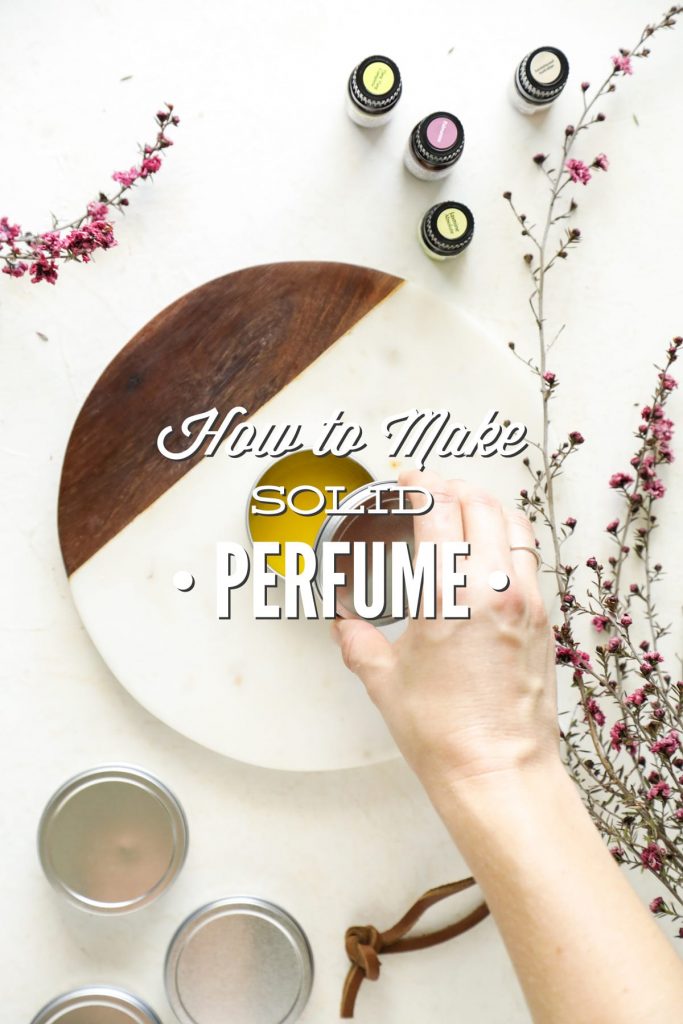
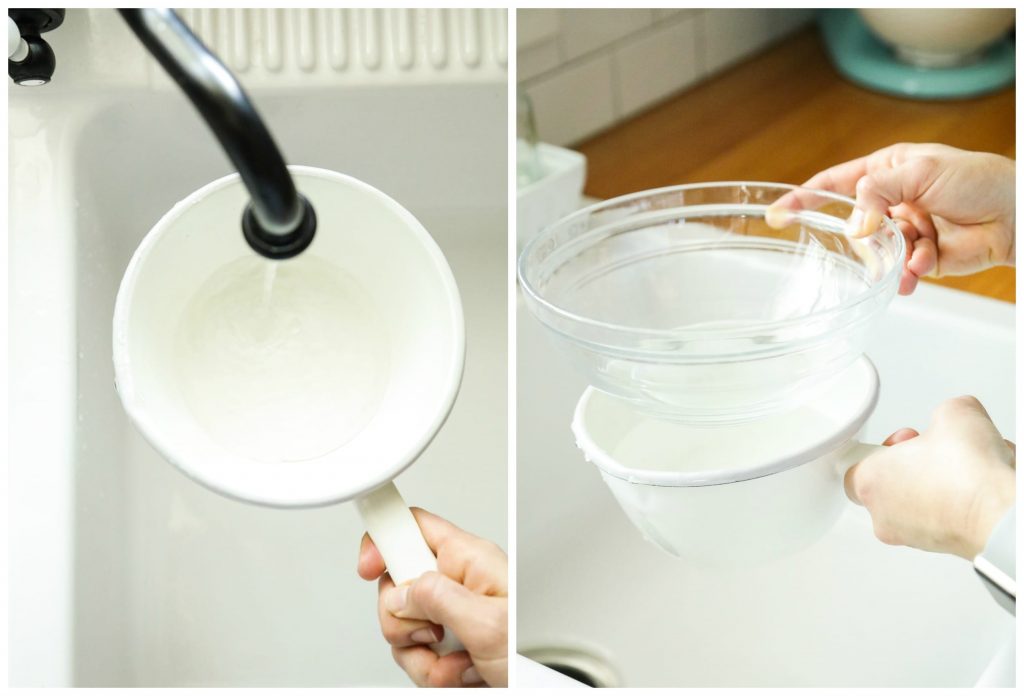
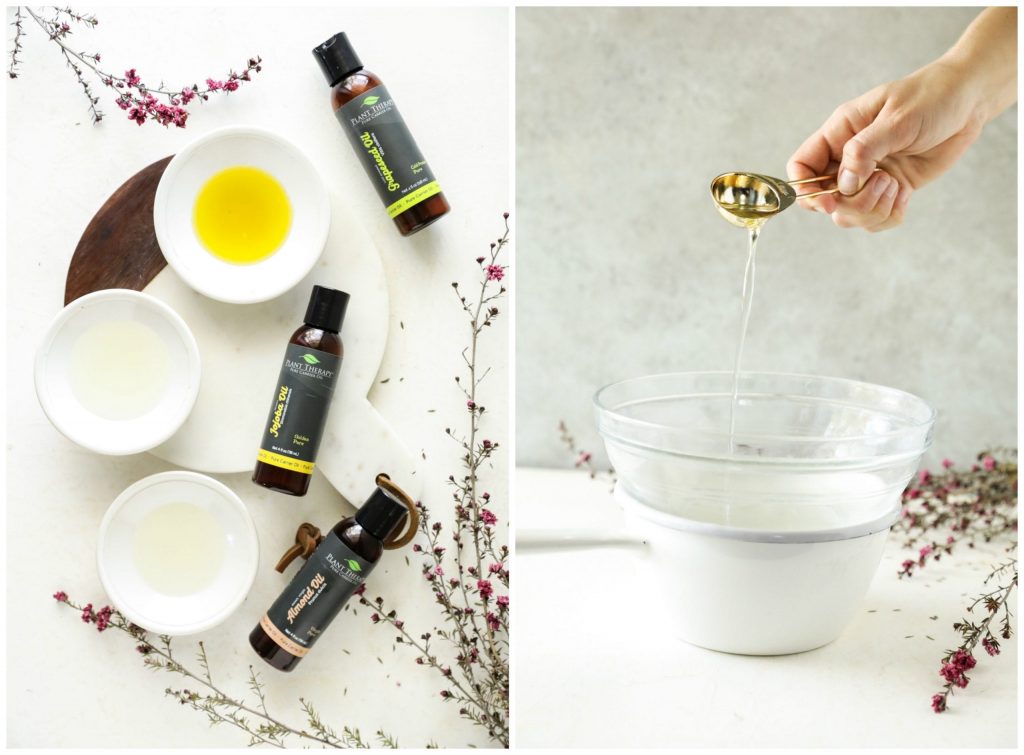
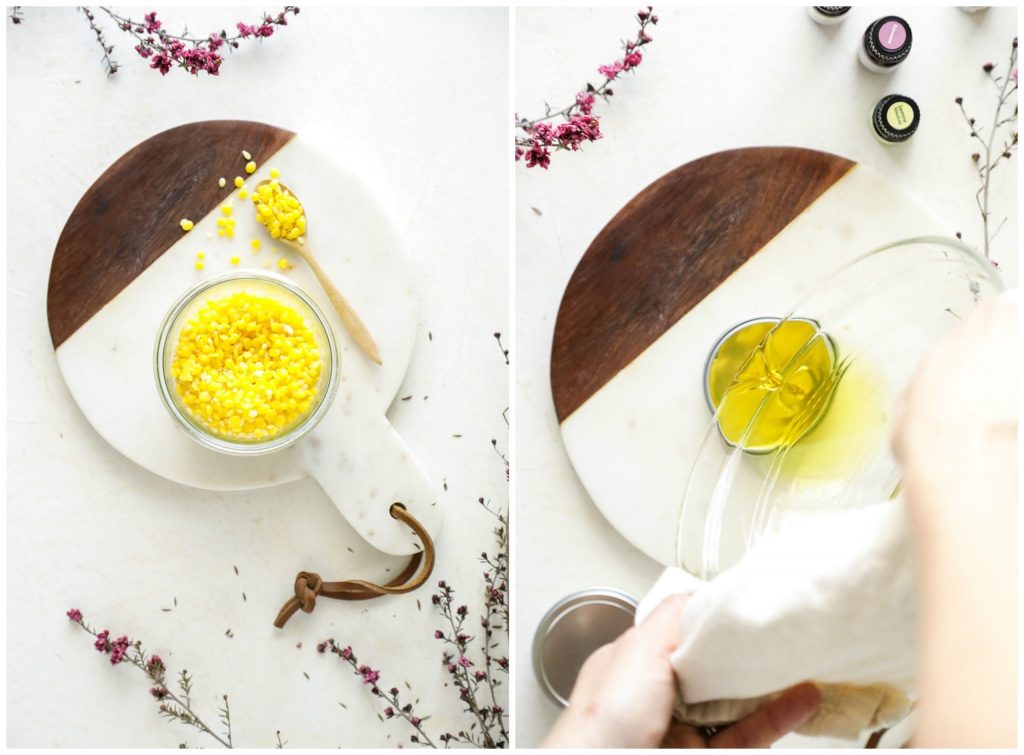
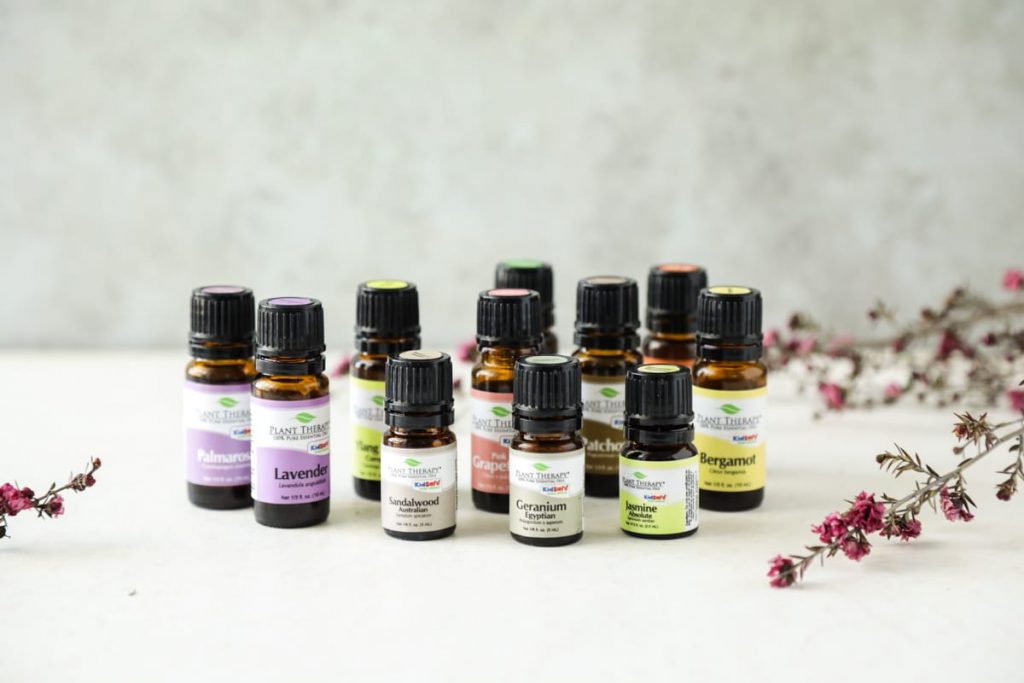
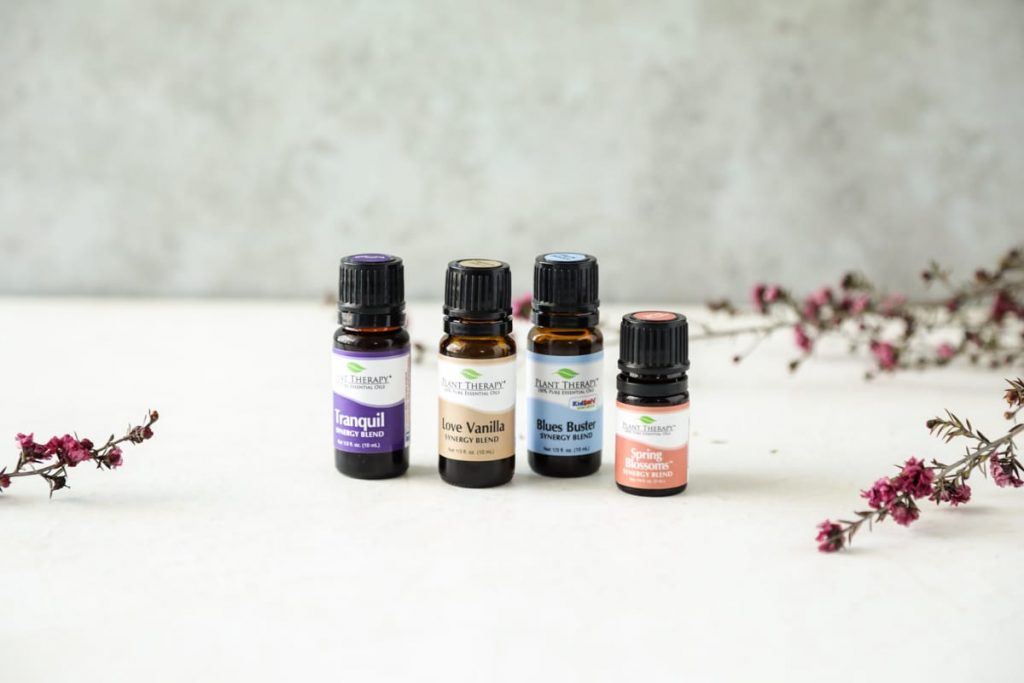
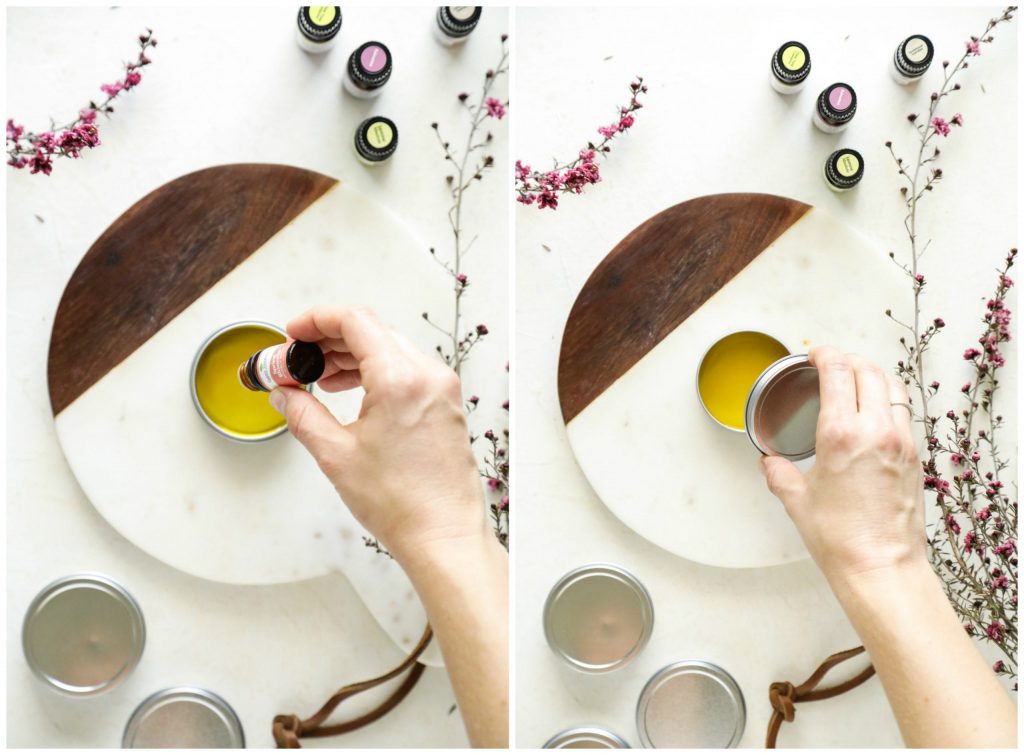
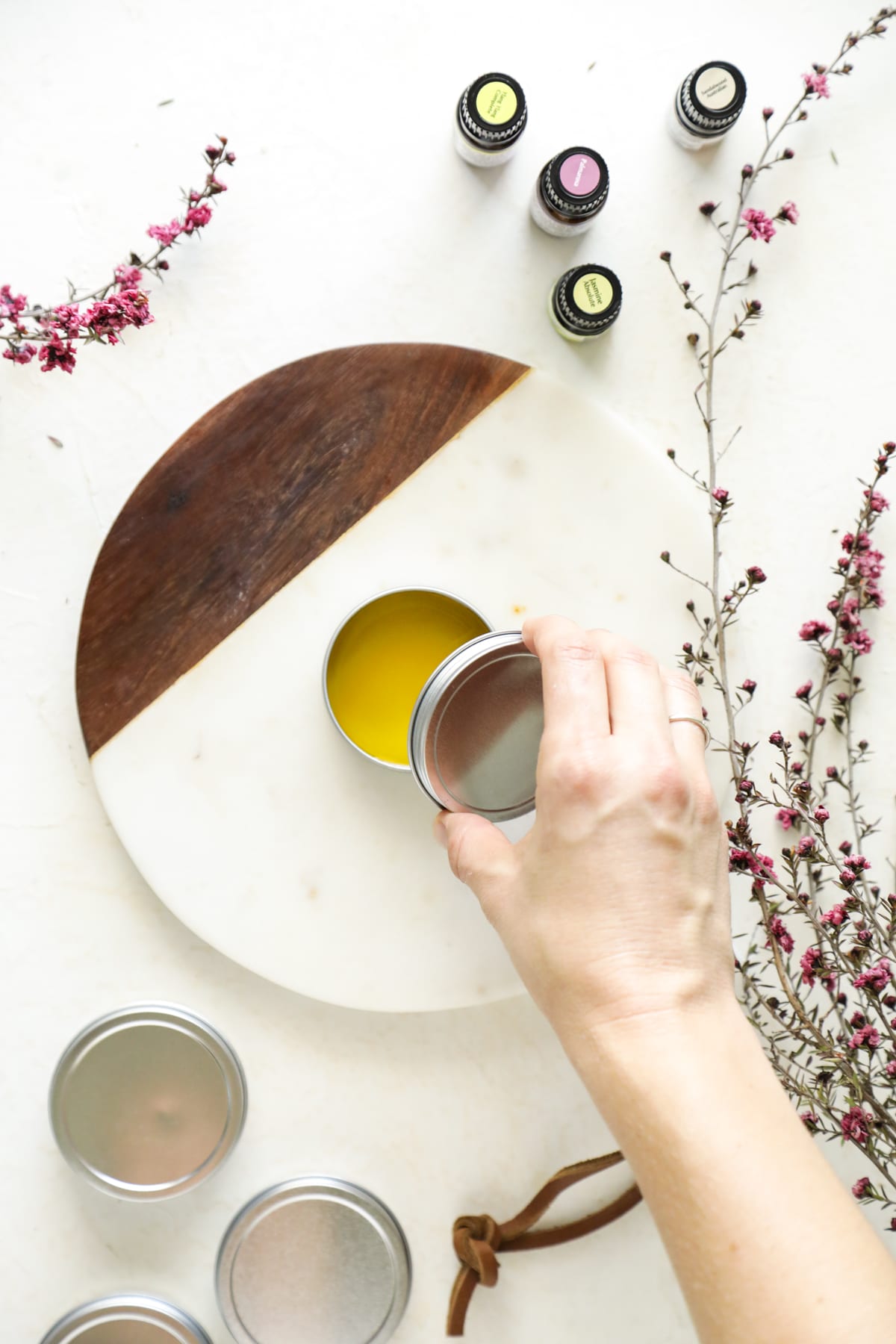
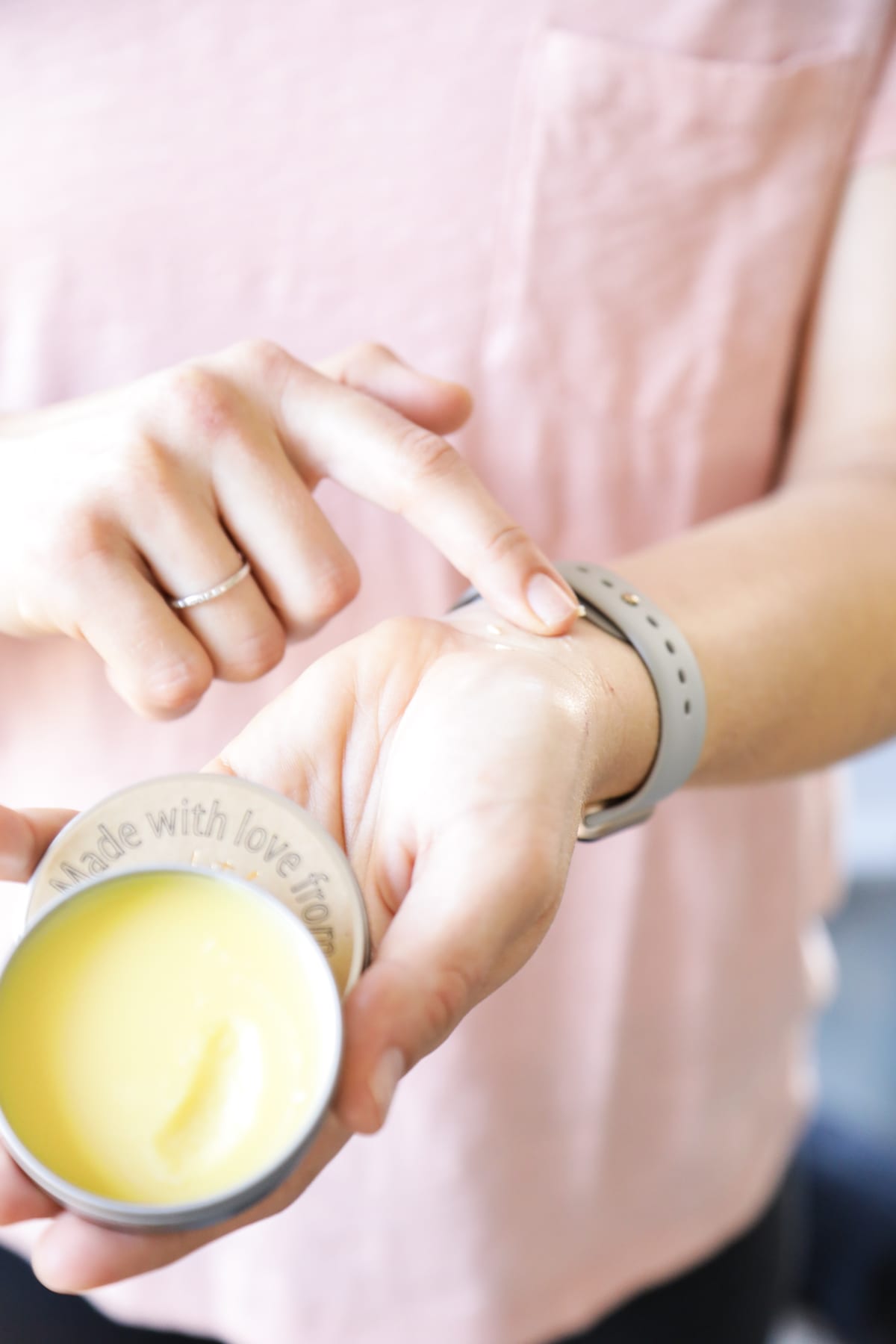
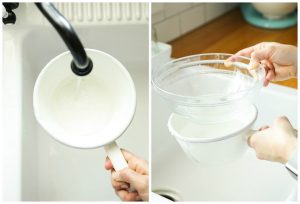
Can I add an oil perfume instead of the essential oils
Hey Gaye, I’ve never tried that, but I don’t see why not. It’s worth a try. Let me know how it goes.
What is yours or one of yours favorite parfume smell combination? 🙂
I don’t have a favorite. I’ve experimented with quite a few over the years and enjoyed each one.
Cool, I will do that as well, can´t wait 😀 🙂
Help. I used to buy a solid perfume that everyone loves on me. It is Patchouli and Smoked Citrus. The company has gone out of business so I thought I would simply make my own. Any thoughts what the recipe would be? I can’t seem to come up with how to make the ‘smoked citrus’. orange is the base note but I am struggling with the ‘smoked’ access. Any help is much appreciated.
Hi Scott,
I’ve never tried to get a smoky smell from an essential oil. I would recommend googling “smoky essential oils”
LS Team.
Hi Scott, Woodsy and Musk my be a good alternative .
If you never found your smoky oil, try Vetiver!
.thank you Kristin! Looking forward to trying this. I have lots of trips coming up, I’m TSA Pre ✔️, but will be traveling out of the country & I’d like to carry as little of 3-1-1 items that I can ?
When I tried to make one I just added 10 drops of essential oil after fews hrs my solid perfume is not too oily its too hard that you cannot put it on my wrist. Is that because I just added few drops of essential oil?
Hey Angel, This is a solid perfume, so it’s meant to be hard. The hard state is from the beeswax.
I tried it but i dont know what went wronh because its hard not too oily so when I tried to apply on my wrist theres no oil.. Do I need to put more oil?
Hey Angel, I’m sorry, I don’t understand your question. Can you explain the issue?
Brad, you may look at what essential oils you are using. If you are using pure, therapeutic grade oils you’ll only need 1/2 the amount suggested… if that. Know your oils. My oils would only require 2-3 drops depending on which oil I choose for the perfume… otherwise the scent would be far too strong, and you’d be wasteing a lot of your oils.
The recipe is a good one though!
There is no such thing as therapeutic grade essential oil. What you are talking about is the strength of the expression, “therapeutic grade” is completely made-up, I think it originated from youngs living, Along with 90% of the other nonsense in the essential oil world.
Guidelines for skin safe essential oil use dictates a maximum of 15 drops per ounce of oil/wax. This recipe is about 2.5x that, and many of the essential oils listed can cause intense photosensitivity. Any complaints about irritation?
Hey Brad, I worked with a certified aromatherapist from Plant Therapy to make sure the dilution is accurate and safe. I also personally use this perfume, so safety is important for myself and anyone making this. For perfume, this dilution (based on my own research from top essential oil sources and guidance from the aromatherapist) is fine. This dilution wouldn’t be advised in a lotion or an application that would go on a larger surface of the body. Perfume is used very, very sparingly. Thanks for sharing your concern. You’re definitely welcome to tweak my recipe to decrease the amount of essential oil, based on your research, if desired.
Love this! It’s everything I’m looking for as I’ve just started experimenting with rollerball EO perfumes! And Plant Therapy is my go-to for oils too!! Thanks! I’ll be trying as soon as I can locate some decent carrier oils (as I’m i China) or find a good compliment for coconut oil!
Awesome, Lisa! I’m so glad the post was helpful. I would love to hear what you come up with.
Hi
Great project and thank you for the tutorial. Much appreciated.
As a vegetarian and an animal activist, is there an alternative I can use to beeswax?
With thanks.
Cee Jay.
Hey Cee Jay, You could find a local beekeeper to source the beeswax from, or try using candelilla wax. I’m not sure if the candelilla wax will sub 1:1.
There are other slightly better wax alternatives to beeswax for the vegan folks out there.
Because candelilla wax is so dense, one unit of the vegetable wax is roughly equal to two units of beeswax. Bayberry Wax is another… and sustainably-harvested carnauba wax. Just some food for thought there.
Thanks so much for sharing, Obsidien.
Hey Kristin, I was wondering how long the fragrance lasts until it goes away? Thanks!
Hey Leah, It lasts about 1-2 hours.
I understand fragrances on people can vary greatly, however how close does someone have to be to smell the perfume? I’m thinking this perfume is more of a scent that people catch a slight whiff of when next to you, which would be what I’m looking for. Maybe your husband could weigh in on this one?
Hey Katie, Essential oil perfume is incredibly subtle. Dustin needs to be sitting right next to me to smell the perfume. It’s not the kind of perfume that can be detected a few seats over ;). Homemade perfume is almost more for the person wearing it versus other folks–it’s like your own personal aromatherapy in a sense. Hope that helps! You could increase the essential oil amount, if desired, and that may help with making the perfume even stronger.
Sounds like exactly what I’m looking for. Thanks for the reply, Kristin!